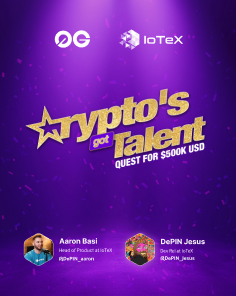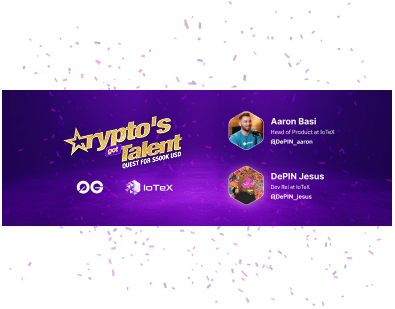The DePIN Explorer - DePIN Scan
Trending 🔥
DePIN Market Cap
$8,668,467,389
+0.5%
Volume
$6,357,169,788
-13.6%
DePIN Projects
433
DePIN Devices
42,691,115
ioID Devices
33,895
DePIN Projects
Liquidity mining page highlights DePIN projects that have special promotions to grow their liquidity pools on certain DePIN dexs to ultimately help grow the network. Currently 4 DePIN projects are listed here.
Project | Token | Category | Market Cap | Token Price | |
|---|---|---|---|---|---|
 | GEOD | Sensor | $62,398,082 | $0.142 | |
 | XNET | Wireless | $1,244,320 | $0.009 | |
 | WIFI | Wireless | $320,107 | $0.001 | |
 | DWIN | Wireless | - | $0.007 |

3 days ago
Fuse Energy Secures $70M Funding, Elevating Valuation to $5BThe decentralized finance landscape has recently witnessed a significant development with Fuse Energy, a Decentralized Physical Infrastructure Network (DePIN) project on the Solana blockchain, successfully raising $70 million in a Series B funding round. This investment, led by notable venture firms Lowercarbon Capital and Balderton Capital, elevates the company's valuation to an impressive $5 billion. This funding marks a pivotal moment in the convergence of blockchain technology and real-world utility, indicating a shift where cryptocurrency infrastructure begins to play a crucial role in powering our physical world.
Fuse Energy aims to revolutionize the global energy grid by creating a decentralized network that allows individuals to produce, trade, and consume energy peer-to-peer. The recent funding serves as a strong endorsement from major investors, highlighting the project’s potential to disrupt the traditional energy sector. The capital raised will likely accelerate development efforts, expand the network's physical footprint, and attract more users to its ecosystem. By facilitating peer-to-peer energy trading, Fuse Energy empowers producers, enhances grid resilience, and promotes a faster transition to renewable energy.
However, despite the promising outlook, Fuse Energy faces several challenges. The heavily regulated energy sector presents complex engineering and legal hurdles, particularly in integrating with existing infrastructure. Achieving mass adoption is crucial for making a tangible impact, which depends on user-friendly technology and compelling economic incentives. The success of Fuse Energy not only signifies a landmark event for the Solana ecosystem but also sets a new benchmark for the DePIN sector, potentially attracting more developers and capital to innovate in physical infrastructure networks. This funding is a beacon for the future of decentralized technology, showcasing the potential for blockchain to serve as an operational backbone for critical global systems.

3 days ago
The DataHive AI Referral Program Is Live!The decentralized data factory grows with its community, and now your Hive can earn even more together.
Here’s how rewards system work:
Start Earning Instantly
Every new user gets rewarded from day one:
• 1,250 points for installing the [browser extension](https://chromewebstore.google.com/detail/datahive/bonfdkhbkkdoipfojcnimjagphdnfedb)
• 1,250 points for installing the [mobile app](https://play.google.com/store/apps/details?id=acl.datahive.app)
Grow the Hive. Earn More.
When you invite others, you earn a percentage of everything they generate:
• 20% from direct referrals (Level 1)
• 10% from their referrals (Level 2)
• 5% from the next level (Level 3)
What “Pending” Means
Users who join through your link start in Pending and already generate percentage rewards, and once they reach 100 hours they become Active and unlock the full bonuses where you receive 2,500 points and they receive 1,250 points if they joined via a referral link.
Share your [referral link](https://datahive.ai/earn?utm_source=tg&utm_medium=post&utm_campaign=site) and grow your hive! 🐝

5 days ago
Cryptocurrency Market Experiences Significant DeclineThe cryptocurrency market has experienced a notable decline recently, as reported by ChainCatcher using SoSoValue data. Over a 24-hour period, most cryptocurrencies saw drops ranging from approximately 2% to 5%. The DePIN sector was particularly hard hit, leading the decline with a significant drop of 5.8%. Within this sector, Filecoin (FIL) fell by 6.29%, while Render (RENDER) experienced an even steeper decline of 7.07%. Additionally, Bitcoin (BTC) fell by 3.19%, slipping below the $86,000 mark, and Ethereum (ETH) decreased by 4.11%, dropping below $3,000.
Other sectors also faced losses, with the CeFi sector declining by 3.02% in 24 hours. Aster (ASTER) was notably affected, dropping 15.82%. The Layer1 sector fell by 3.34%, with Sui (SUI) down 8.35%. Meanwhile, the Layer2 sector recorded a 4.03% drop, and SOON (SOON) fell by 11.09%. The Meme sector saw a decline of 4.31%, although PIPPIN (PIPPIN) managed to defy the trend with a remarkable increase of 25.96%. The PayFi sector decreased by 4.81%, with Telcoin (TEL) down 8.85%, and the DeFi sector dropped by 4.93%, although MYX Finance (MYX) surged by 9.96% during this period.
The overall performance of the crypto sector indices reflects these trends, with the ssiAI, ssiDePIN, and ssiRWA indices falling by 7.05%, 6.8%, and 6.41% respectively. This decline highlights the volatility and challenges faced by the cryptocurrency market, emphasizing the importance of caution for investors. It is essential to note that the views expressed in this article are solely those of the author and do not represent any official stance of the platform, nor should they be considered as investment advice.

6 days ago
Mambo WiFi Partners with Helium to Expand Internet Access in BrazilMambo WiFi has recently joined forces with the Helium-powered decentralized physical infrastructure networking (DePIN) platform to enhance internet access across Brazil. This partnership is set to leverage Mambo WiFi's extensive network of over 40,000 access points, which will significantly expand Helium's reach in a country where internet access is often uneven. Helium's decentralized model aims to democratize internet connectivity by transforming small devices into mini cell towers, thereby extending mobile data coverage and alleviating congestion on major carriers' networks.
Brazil boasts the fifth-largest digital population globally, with over 161.4 million internet users as of early 2023, representing approximately 75% coverage of its estimated population. Despite these figures, Helium reports that a significant portion of the population remains under-connected, relying heavily on shared or public WiFi for their internet needs. This situation often leads to congestion and unreliable service, highlighting the ongoing digital divide in the nation. The partnership with Mambo WiFi aims to address these challenges by providing a more reliable and accessible internet service to millions of users.
In addition to this partnership, Helium has opened an International Waitlist to foster new collaborations with communities, enterprises, and deployment partners globally. This initiative is part of Helium's strategy to expand its network and enhance mobile services in areas with high demand. As the DePIN sector continues to grow within the Web3 landscape, Helium's innovative approach to internet access could play a crucial role in bridging the digital divide in Brazil and beyond.
Signup for latest DePIN news and updates






.png)

















